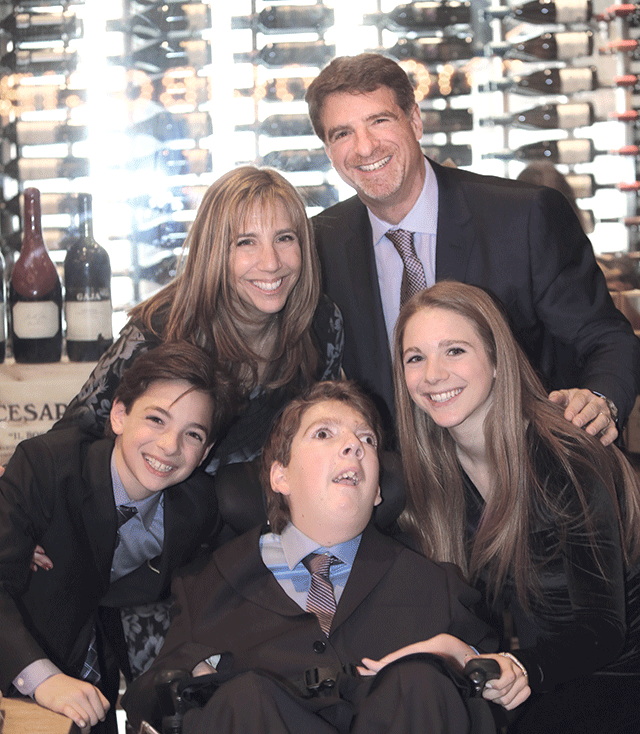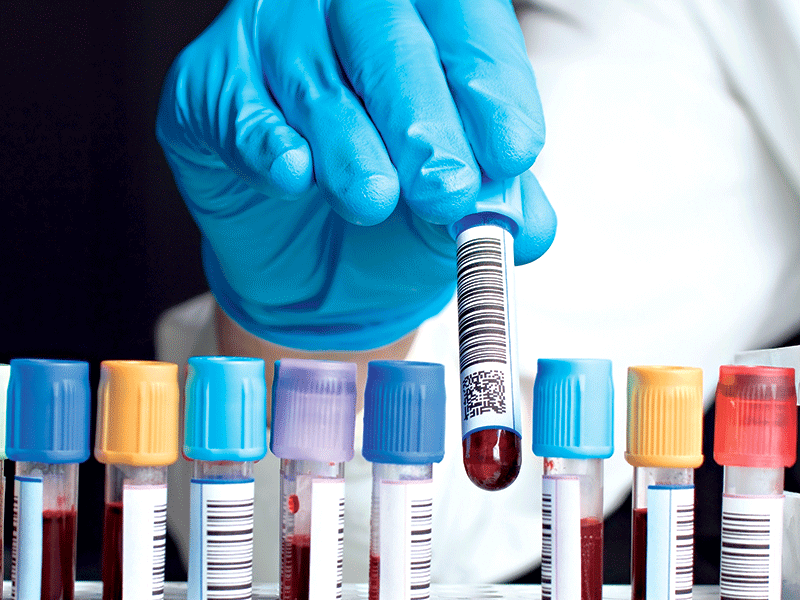Jacob Schwartz was just a few weeks old when his parents noticed something was wrong. His eyes didn’t seem to track, and he was having difficulty holding his head up.
Within a few months, they received the devastating diagnosis that their first-born child had Canavan disease, a fatal, incurable genetic disorder.
Adding to the family’s anguish was the knowledge that in the United States, Canavan was among the genetic diseases that were part of the standard screening for Ashkenazi Jewish couples. At the time, 1997, in Canada, Jews were only being routinely tested for Tay-Sachs, the most common of the genetic diseases identified in the Ashkenazi Jewish population.
READ: CONCERNS RAISED ABOUT PHYSICIAN-ASSISTED DEATH POLICY
Jacob, now 18, has lived far longer than was ever expected, but his mother Ellen lists the things he can’t do. He can’t see, eat or move, and suffers from severe scoliosis. Recently, the family learned his disease has “severely progressed.”
“I love Jacob with my heart and soul. He’s changed my life for the better, but his life is very difficult, and he struggles so greatly,” she said.
“I’m so grateful he’s here. Knowing I’m going to lose him is quite devastating.”
Not long after learning about Jacob’s prognosis, Ellen and her husband Jeff, along with National Council of Jewish Women Canada (NCJWC), began lobbying to have provincial health care plans offer and cover a wider range of genetic tests, and to expand the community’s awareness of testing.

The Schwartz family’s foundation, Jacob’s Ladder, has raised almost $3 million for awareness about genetic testing, research and therapy programs.
Today, in Canada, seven genetic diseases are on the standard testing panel for Ashkenazi Jews. All the diseases are recessive, meaning both parents must be carriers to have an affected child.
Jews of Sephardi background are advised to be screened for Tay-Sachs and thalassemia, according to Toronto’s Mount Sinai Hospital.
Lorraine Berk, chairperson of Jewish genetic diseases project for NCJWC, recalls the first mass screening for genetic diseases NCJWC organized in 2001 attracted about 300 people.
Initially, NCJWC volunteers across the country focused on educating doctors and rabbis, professionals who would see young couples, about the need for genetic testing.
Now, as testing becomes one more routine task at the doctor’s or midwife’s office, NCJWC organizes fewer large screenings. However, every few years, it sponsors one and every time, even when just 40 to 60 people come out, carriers are discovered, Berk said. About one person in 30 in the Ashkenazi Jewish community is a carrier for Tay-Sachs, the most common of the genetic diseases.
For Schwartz, genetic testing has become paramount. “We celebrate every day he [Jacob] is alive,” she said. “But would I knowingly bring someone into the world who is going to suffer? I don’t think I would do that.”
In many ways, expanded testing and awareness has been an unheralded good-news story.
While no numbers are available, Dr. David Chitayat, head of the prenatal diagnosis and medical genetics program at Mount Sinai, said the incidence of babies born with Tay-Sachs to Jewish parents in Ontario is very low, because of testing. Most Tay-Sachs babies today are born to non-Jewish parents.
READ: ADVOCATE PUSHES GAS STATION AID FOR DISABLED PEOPLE
At the National Tay-Sachs and Allied Diseases Association in Boston, executive director Sue Kahn said the group once saw about 100 Jewish children born with Tay-Sachs annually. Today, the association – which also represents Canadians, since the Canadian branch closed several years ago – sees five or fewer. But it’s too early to declare a victory, she cautioned.
“Some people say Tay-Sachs has been eradicated. It makes us crazy,” Kahn said.
Children are still being born with the disease, because intermarried Jewish couples and their physicians don’t see a need for testing, when in fact, Tay-Sachs is prevalent in other ethnic groups, such as French Canadians. (The association is currently involved in a study looking at the incidence of Tay-Sachs in the Irish population in the United States.)
On occasion, children conceived using untested donor eggs or sperm can also have the genetic disease, Kahn said.
There is also a risk of complacency. Unlike the large-scale efforts to eradicate infectious diseases, genetic testing is an ongoing process. Some people assume that because there is no family history of disease, they are unaffected. However, because these diseases are recessive, there is still a risk, Kahn said.
She also hears people say their mother was screened, so they don’t need screening, not realizing that many more diseases have been identified since Tay-Sachs screening began.
For ultra-Orthodox families, where arranged marriages are the norm and strict halachic rules about family planning apply, genetic screening takes on a different complexion.
Dor Yeshorim, an organization started by a rabbi who lost four children to Tay-Sachs, screens thousands of haredi young people in North America, Europe and Israel annually.
In Toronto and Montreal, a representative from the New York-based group visits annually and tests Grade 12 students in girls’ high schools and boys’ yeshivas. In Toronto, about 300 young people are tested annually for nine fatal or debilitating recessive genetic diseases, said Marianna Dyman, the Toronto representative for the organization.
A similar number of teens are tested in Montreal, said a Montreal spokesperson, who did not want to give her name. In fact, few people would enter a shidduch without first consulting Dor Yeshorim, she said.
But in an age when consumers seek to know everything about their health, Dor Yeshorim’s results are cloaked in secrecy, so that individuals don’t know if they are carriers of a recessive gene or which disease it is. Those tested receive only an identifying number.
Matchmakers call Dor Yeshorim with the identification numbers for a proposed couple, and the introduction only takes place if the two numbers are cleared.
READ: FUNDRAISER BENEFITS HOSPITAL FOR SICK CHILDREN
“The person who is a carrier is not sick,” said Dyman explaining the confidentiality policy. “But for some people, maybe those who are less educated, that would carry a stigma for that person.”
Since the organization started, about 400,000 individuals have been screened, and about 1 in 100 matches are incompatible, or as a letter from founder Rabbi Yosef Ekstein in Dor Yeshorim’s newsletter states, “sparing over 4,200 families the horror of losing children.”
Dyman says it’s a privilege to assist in the screening program. “It’s quite beautiful to remove the sorrow from the family. It’s such a mitzvah.”
